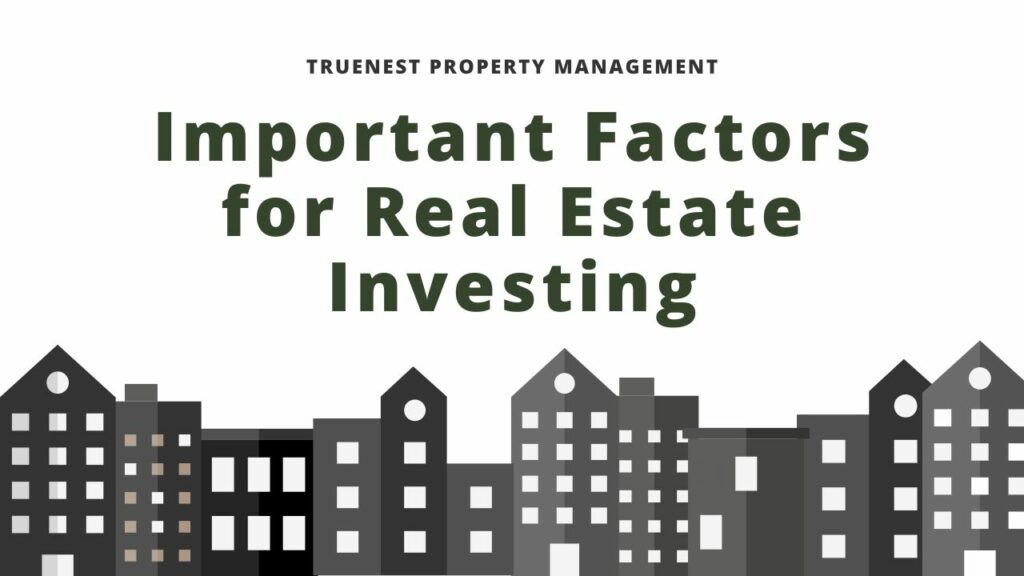Important Factors for Real Estate Investing

There are many things to consider and learn before investing in real estate. Here are some vital factors that need to be considered prior to property investing.
Where Is the Property Located?
Location matters. Whether in-state or out-of-state, you need a property address that is in heavy demand to get the best investment returns. The reputation of the neighborhood always comes into account, including the amenities and views it offers.
If your property investment is commercial real estate, you should check if it has transport options. Is it close to a transport hub, freeway, or tax-free zone?
Real estate investors must also be future-oriented and check a property’s growth potential. Investment shouldn’t be limited to short-term results. Even if a neighborhood is initially vacant, over time and as new developments occur, modern infrastructures may appear and it may be in the form of highways, schools, restaurants, parks, and train stations.
In that case, the demand for properties in that area would increase, so property investors should not limit themselves to what they can see, but instead look at the potential growth of the area. This is why a medium to long-term perspective is preferable as an investor.
If you’re not sure what an area’s potential is, drop by the local town hall or urban planning office and ask about the current and upcoming city plan developments. This will enable you to make an informed decision that works in your favor!

What Is the Real Estate Valuation?
Remember to look into the property valuation as it can affect your finances. The value of the property has an impact on its taxes, insurance, purchase price, and listing price.
You can check these real estate valuation methods to learn more:
- Sales comparison approach: Review the current property sales offering similar features, whether old or new.
- Cost approach: Assess the cost of the land and construction, subtracting the depreciation (applicable to new construction).
- Income approach: Compute the income you expect when you convert the home into a rental.
What Is the Goal of the Investment?
The capital needed to buy an investment property isn’t a negligible amount, and it could take some time to find a suitable buyer when liquidating this type of asset. It’s important to always have a good reason for investing and a specific goal.
Check out these categories and see which fits your objectives:
- Buy and self-use: You won’t be renting anymore and focus on owning a property whose value can grow more over time.
- Buy and lease: Earn more income and take advantage of the future property appreciation by opting to hold on to the asset for a longer period of time. Becoming a landlord may require you to invest in maintenance, tenant screening and marketing, among other things, to keep the property in excellent condition.

- Buy and sell (short-term): Buying and selling a property in a short amount of time is less time-consuming than other options, and it allows you to enjoy the profits obtained more quickly.
- Buy and sell (long-term): Holding on to real estate longer means you can enjoy the property appreciation and profit from later returns when you retire.
What Opportunities Could Offer a Positive Cash Flow?
Cash flow refers to the money that is moving in and out of your business. Having a positive cash flow means you’re incurring more than you’re spending, so a successful property investment should result in positive cash flow.
Create projections for these kinds of profits and expenses:
- Expected cash flow from your rent income
- Potential increase in value due to appreciation when you hold on to your real estate for a long period of time
- Advantages of depreciation (and available tax benefits)
- Cost-benefit analysis of renovating a property before selling it for a higher price
- Cost-benefit analysis of mortgaged loans vs. value appreciation
What Is the Impact of the Credit Score?
The better your credit score, the easier it will be to find a lender willing to approve your financing application. Good terms and interest rates are given to investors with a high credit score. Scores greater than 800 are considered satisfactory and allow investors to obtain the best mortgage offers since the lenders will trust you won’t default on your loan payments.

How do you get a satisfactory credit score? Here are some tips you can follow:
- Always pay bills on time and avoid missing a payment. Consider setting up auto payment.
- Pay what you owe.
- Don’t overextend your credit beyond 30%.
- Prevent closure of unused credit cards, as long as annual fees aren’t billed.
- Check that credit report details are accurate.
Bottom Line
Making real estate a part of your investment portfolio is a good way to diversify your assets. Investing in real estate provides tons of benefits, from steady cash flow to property appreciation, and minimal taxes. Evaluate the factors mentioned above before investing in a property.
If you’re looking for a trusted real estate professional to guide you on real estate investments, contact TrueNest Property Management today! We provide transparent and detailed real estate information.
